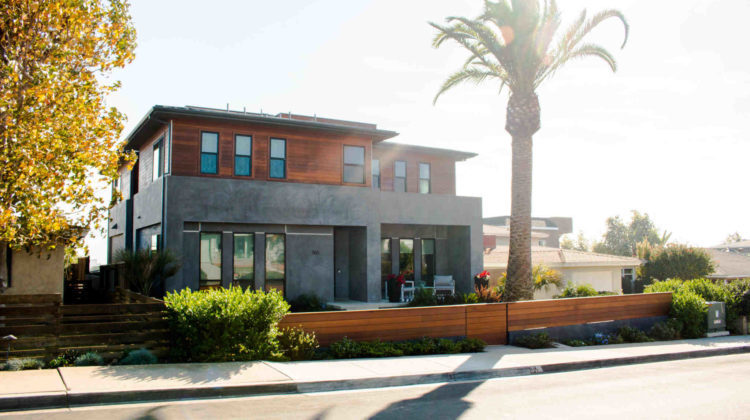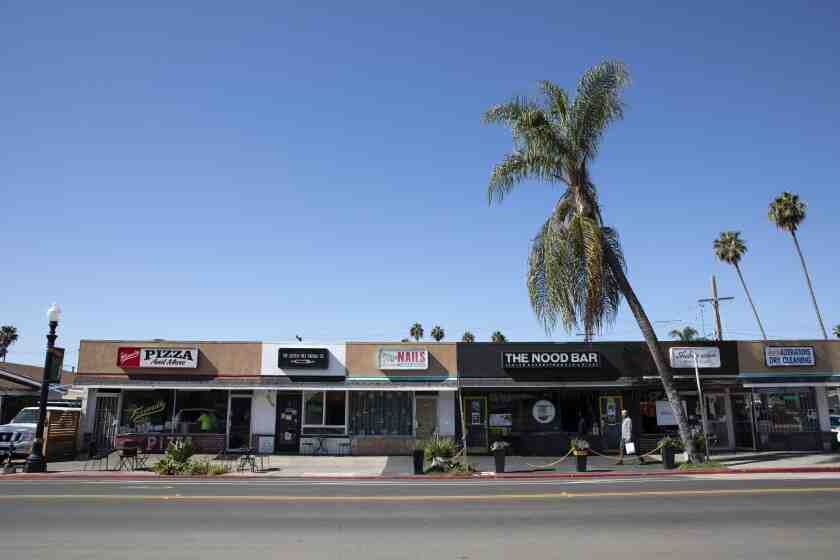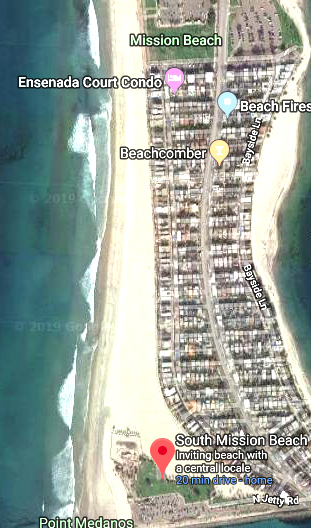
California Coastal Commission planners are recommending the approval of the planned San Diego citywide limit on short-term leases, despite acknowledging that the new restrictions have the potential to reduce the number of such leases halved.
A commission staff report released this week concluded that the long-sought San Diego regulations seek to strike a balance between providing access to the coast and preserving long-term housing. Even so, planners are calling on the city to add a key provision requiring San Diego to review the new regulations in seven years to assess the potential consequences of such a dramatic change in land use.
“It is difficult to predict exactly what ramifications such a profound change will have on the STRO market [short-term residential occupancy] specifically and overnight accommodation in general, and the risk of substantial negative impacts on coastal access exists, “according to the report. “Due to the long timetable and the strong effort required to move this amendment forward, it is possible that even if negative impacts are later identified, the resources and willingness to address them may not be present if there is no clear requirement built into the LCP [Local Coastal Program] to allow the city, the public and the commission the opportunity to re-evaluate the program after several years of implementation. ”
In March, the full commission will consider recommending staff to approve holiday rental regulations, which may take effect as early as this reduction.
Get the La Jolla Light every week in your inbox
Free news, features and sports on La Jolla, every Thursday
You may occasionally receive promotional content from La Jolla Light.
Although the ordinance that the City Council approved last year originally had an implementation date of July 1, the elected leaders agreed this month to delay the start for several months while waiting. the result of a review required by the Coastal Commission. Council members were also concerned about the start of a new program so close to the upcoming summer season, when the holidays typically booked their rentals months earlier.
“I am very pleased that the staff have taken into account all the work done in this and are acceptable to him,” said Venus Molina, chief of staff for Councilor Jennifer Campbell, whose office led the effort to comes up with a compromise plan for regulating home-sharing, a long hot button issue in San Diego. “I think they have taken into account our compromise and how we are trying to strike a balance between the release of the housing stock into the market and the supply of low-cost coastal accommodation.”
If the commission approves the regulations next month, Molina said, they could go into effect by October, after the busy summer season.
The San Diego ordinance aims to limit city-wide home rentals to 1 percent of the city’s more than 540,000 housing units, or about 5,400. An exception has been made for Mission Beach, which has a long history of holiday rentals. There, the allocation is more generous, with licenses limited to 30 percent of the total community housing units, or about 1,100.
Together, the 6,500 licenses available would mean a 47 percent reduction in the current estimate of 12,300 holiday rentals.
Based on a September survey of the city of San Diego, about 39 percent of city-wide short-term rentals were in the coastal area. Of those, 93 percent were all-home rentals that accommodate an average capacity of 5.8 tenants, with an average evening rate of $ 306, according to the commission’s staff report.
The new city regulations allow for only one license for individuals who rent out their entire residence for more than 20 days a year, but an unlimited number of licenses will be allowed for holiday rentals of less than 20 days a year or for house sharing. operations where a host rents a room or two.
The two-year licenses will be allocated through a lottery system, although priority will be given to longer-term leasing operators who have no code-breaking associated with their units during the last two years. To ensure that residents from all communities have the ability to obtain a license, the citywide lottery – except for Mission Beach – will link allocations in each community planning area to the percentage of applications received in each of those areas. That provision is supported by the staff of the commission.
In its report, the agency noted the long-term tension between providing more affordable access to the coast through short-term leases and the potential to reduce year-round housing.
On the one hand, the city’s proposed limitation on short-term leases “can be considered inconsistent with LUP [land use plan] policies that fully support the protection and provision of housing. overnight, “the report said. “STROs provide a service to coastal visitors looking for a different type of overnight accommodation, and often more affordable than what traditional hotels can provide.”
At the same time, commission staff acknowledged that it would not be a fact that housing costs would fall if fewer holiday rentals were available.
“It’s not clear how much STROs affect the price or availability of housing,” the report says. “The current estimate of 12,300 STROs represents less than 2.5 percent of the housing stock in the city, and particularly in the coastal area, most of the homes currently used for STROs are unlikely to be are not considered affordable to rent or purchase. ” ◆
A turnkey property is a completely renovated house or apartment building that an investor can buy and rent immediately. A turnkey home is often owned by a company that specializes in restoring older properties.
What does VRBO stand for?

The company long known as VRBO, an acronym for Vacation Rentals by Owner, is changing its name to Vrbo, pronounced VER-bo. ‘
What is the difference between Airbnb & amp; VRBO? Vrbo only offers self-catering holiday homes. It generally does not offer “shared” spaces such as private rooms or more unusual options such as campsites. Airbnb offers self-catering holiday homes as well as shared spaces and even hotel rooms.
What does the V stand for in VRBO?
Vrbo – representing Vacation Rental By Owner – has been around since 1995. … The parent company of Vrbo Expedia Group also has the HomeAway home rental service.
How do u pronounce VRBO?
VRBO for â € œver-bohâ € We had done some research and learned that â € œver-bohâ € is easier to remember and easier to say in other languages, so we decided to make it official by changing our brand name from abbreviation for word: VRBO is now Vrbo.
Who designed the VRBO logo?
Brand New: New Logo and Identity for Vrbo by FÖDA.
Can VRBO be trusted?
VRBO is decently reliable when it comes to getting a good property to rent for your vacation. As long as you do your research and keep in touch with the property owner, you should be able to avoid many common booking pitfalls, and solve the ones you have without having to contact VRBO directly.
What does Airbnb mean?
What is an Airbnb and how does it work?
Airbnb, as in â € œAir Bed and Breakfast, â € is a service that allows property owners to rent their spaces to travelers looking for a place to stay. Travelers can rent space for multiple people to share, shared space with private rooms, or the entire property for themselves.
Does Airbnb own Vrbo?

Airbnb was founded in 2008 and now boasts over 5.6 million listings in over 200 countries. Vrbo (originally known as Vacation Rental by Owner) was founded in 1995 and is now owned by the Expedia Group.
VRBO is bigger than Airbnb? VRBO: Compared to Airbnb’s 5.6 million listings, VRBO boasts over 2 million rentals worldwide. Keep in mind, however, that while VRBO offers fewer rentals, they only list entire homes, condos, or apartments.
Does Airbnb own other companies?
In March 2019, the company acquired HotelTonight, a website for booking last-minute hotel rooms, for more than $ 400 million. In August 2019, Airbnb acquired Urbandoor, a global online marketplace that offers extended stays to corporate customers.
What companies has Airbnb invested in?
Issue: Three companies (Podz, Gigfairy, and Glow) were acquired, while one company – Coinbase – IPO’d with a valuation of $ 65.3B in April 2021. The best VC investor: Andreessen Horowitz (a16z) is the VC’s most active investor, having invested in 4 companies founded by Airbnb alumni including Coinbase, D2iQ, and Preset.
Who are Airbnb partners?
Airbnb See Smart Home Opportunities in Partnerships With Apple, Amazon and Google.
What company owns VRBO?
VRBO was founded in 1995 and acquired by HomeAway in 2006, both of which were acquired by Expedia Group in December 2015.
Who does Vrbo belong to?
One of the oldest booking portals for Vrbo holiday rentals was acquired by HomeAway in 2006. In 2015, the Expedia Group acquired HomeAway.
Is Vrbo a public stock?
Founded in February 2005 and headquartered in Austin, Texas, the company became a publicly traded company in 2011. Expedia Group acquired HomeAway on December 15, 2015. In 2020, the HomeAway and VRBO websites were re-branded as a single Vrbo website.
What are turnkey projects typically?

A turnkey (or turn-key) project is a term typically used in reference to construction projects for which the developer takes full responsibility from design to completion so that the building is available to the buyer in ready condition. -use.
What is an example of a turnkey operation? A turnkey business can refer to a business that can be purchased without having to make any changes to the business model or products sold. For example, a franchise like Taco Bell is a kind of turnkey business.
Why turnkey projects are attractive?
Why are turnkey projects attractive? The advantage of turnkey operation is that it allows firms to profit from the knowledge involved in assembling and conducting technologically complex processes. They make sense in countries where political or economic conditions make it risky to make longer-term investments.
What is a disadvantage of a turnkey project?
The first disadvantage of the turnkey project is that in case the project exceeds the budget, the Construction Company must cover the overages. However, this reduces the burden on the buyer’s shoulders and encourages construction companies to stick to a plan and schedule.
What is a turn key approach?
A turnkey business is a for-profit operation that is ready to use as it is at the time of purchase by a new owner or owner. The term “turnkey” is based on the concept that you only need to turn the key to open the doors to start operating, or to put the key in the ignition to drive the vehicle.
What is considered turnkey?
Often a turn key home just means it has been completely renovated and new. Major turnaround homes are renovated before being put up for sale, usually by companies that specialize in real estate restoration. Those firms can also help buyers manage the property.
What does it mean when something is turnkey?
Definition of turnkey (Entry 1 of 2): built, supplied, or installed complete and ready to operate a nuclear power plant turnkey computer system turnkey also: of or related to building or installation turnkey contract turnkey sellers turnkey.
Does turnkey include appliances?
What is a turnkey property? Turn-key is a term used by listing agents in marketing remarks to indicate that the home is ready to move. This means that all appliances are in working condition and there are no obvious structural or electrical issues with the home.
